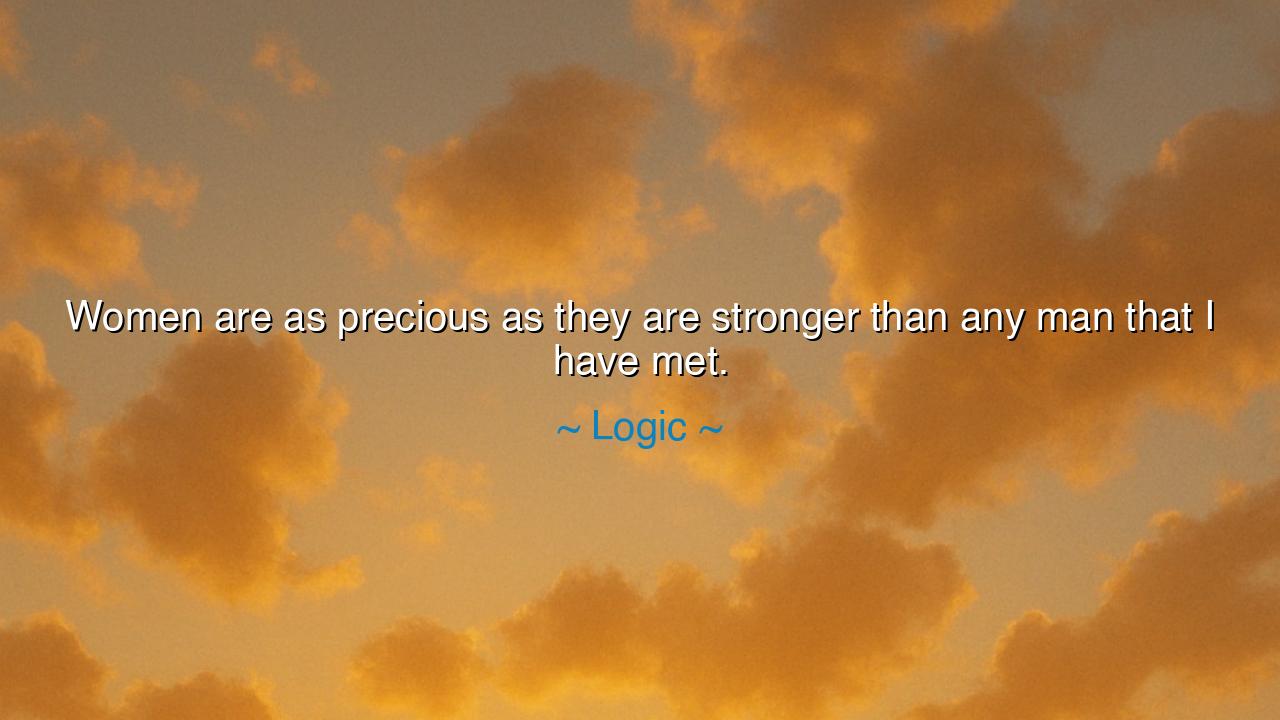
Women are as precious as they are stronger than any man that I






The words of Logic — “Women are as precious as they are stronger than any man that I have met.” — are spoken like a hymn to dignity, born of respect rather than empty praise. In them shines the recognition that women, long undervalued and underestimated, hold within them a dual greatness: the delicate worth of being precious, and the enduring power of being stronger than even the mightiest of men. Logic’s words are both confession and proclamation, lifting the veil from the quiet truth that strength does not always wear the face the world expects.
The meaning is rich and layered. To call women precious is to acknowledge their irreplaceable worth, the sacredness of their role in the fabric of humanity. But to also call them stronger is to see beyond appearances, to recognize the resilience, the endurance, and the courage that often surpasses that of men. Logic speaks not of physical might alone, but of the strength of spirit, the power to endure hardship, to nurture life, to carry burdens both seen and unseen.
History gives us countless witnesses. Consider Harriet Tubman, who, despite her small stature, led enslaved souls through the darkness of oppression into the light of freedom. Her courage eclipsed that of soldiers twice her size, her will proving stronger than any chains. Or look to Mother Teresa, whose frail frame concealed a fierce determination to serve the poorest of the poor, a strength of compassion that shook the conscience of the world. Each of these women embodied both preciousness and strength, showing the truth of Logic’s words.
His statement also bears within it a quiet rebuke to the arrogance of men who measure worth by muscle or authority. For in the hidden chambers of endurance — childbirth, sacrifice, silent perseverance through injustice — women have shown a strength that shames prideful notions of superiority. To recognize this is not flattery, but wisdom: that greatness must be measured not by dominance, but by the depth of spirit and the will to overcome.
Let this lesson be handed down to generations yet unborn: honor women, not merely for beauty or gentleness, but for the power that dwells within them. They are both precious jewels and unbreakable steel, capable of tenderness and of triumph. Logic’s words, though spoken in modern times, echo the wisdom of the ancients: that true strength is not always loud, nor always visible, but it is eternal — and in this, women stand as pillars of the human story.






DCDTD channel
This quote from Logic beautifully emphasizes the inherent strength and value of women. It’s great to see such a positive message, but I wonder if by stating that women are stronger than men, we risk oversimplifying the complexities of gender. Strength isn’t always a comparison, and I’d love to see conversations around women’s power focus on their individual and collective capacities, rather than how they measure up to men.
KPKiet Pham
Logic’s comment about women being stronger than any man he’s met is both empowering and thought-provoking. It challenges the traditional narrative that men are the more physically or emotionally strong gender. But does this imply that women’s strength is only noticeable when compared to men’s? How can we better appreciate women’s strength without always juxtaposing it with men’s?
DLDang ling
This quote by Logic celebrates women’s strength, highlighting them as being more resilient than the men he’s encountered. It’s refreshing to hear such an empowering perspective, but is there a risk in making comparisons between men and women in this way? While it’s important to recognize women’s strength, does comparing it to men’s potentially reinforce unnecessary gender divisions?
MVMinh Vu
Logic's quote about women being both precious and stronger than any man he has met is an interesting one. It reflects a deep respect for women, not just in terms of value but also strength. But what does it mean to say that women are stronger than men? Is strength purely physical, or does it refer to resilience and emotional endurance as well? How can we better understand strength in gendered terms?